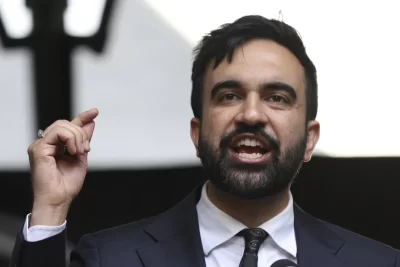
NEW YORK — Prosecutors and defense lawyers agree on this about Marine veteran Daniel Penny’s encounter last year with a distressed, angry man making ominous remarks on a New York subway: Penny didn’t mean to kill him.
But a prosecutor told jurors Friday that Penny “went way too far” in trying to neutralize someone he saw as a threat and not as a person. A defense attorney countered that Penny showed “courage” and put others’ welfare ahead of his own when he placed Jordan Neely in a chokehold that ended with Neely limp on the floor.
Both sides gave opening statements Friday in a manslaughter trial that has rattled fault lines surrounding race, homelessness, perceptions of public safety and bystanders’ responsibility.
Penny’s critics see him as a white vigilante killer of a Black man who was behaving erratically and making dire statements but wasn’t armed and hadn’t assaulted or even touched anyone in the subway car. Supporters credit the 25-year-old Penny with taking action to protect frightened riders — action that he has said was meant to defuse, not kill.
Prosecutor Dafna Yoran told the anonymous jury that the trial isn’t “a referendum on our society’s failure to deal with mental illness and homelessness on the subway” or on police response. Nor is the case about whether Penny had a right to intervene or about his decision to try a chokehold, she said.
Rather, she said, “He used far too much force for far too long. He went way too far.”She said he showed “indifference” toward Neely and “didn’t recognize his humanity.”
Not so, said defense lawyer Thomas Kenniff. He told jurors that Penny applied only as much force as needed to contain a “seething, psychotic” man who had lunged toward a woman with a small child and declared, “I will kill.”
“In that moment, Danny could look away and pray, or he could summon the courage to put the safety of his neighbors above that of himself, to protect those who could not protect themselves,” and he did the latter, Kenniff said.
“It doesn’t make him a hero. But it doesn’t make him a killer.”
Jurors, who were quizzed earlier about their subway experiences, later saw police body camera video of officers performing some lifesaving techniques on Neely after Penny calmly explained he had “put him out,” describing Neely as a “crackhead” who was “going crazy.”
The case has been absorbed into the United States’ fractious politics, with Republican officials speaking up for Penny and Democratic ones attending Neely’s funeral. Both supporters and critics of Penny have held demonstrations; Penny arrived at the courthouse Friday to critical chants from a small group of protesters.
Once in court, Penny sat straight up in his seat at the defense table, mostly looking directly ahead. A member of Neely’s family who was in the audience sometimes sniffled with tears.
“We know who the victim is in this case, and we know who the villain is,” family lawyer Donte Mills said outside court.
Neely’s life was tattered by mental illness and drug use after his mother was murdered and stuffed in a suitcase when he was a teen, his family has said. By 30, he sometimes entertained subway riders as a Michael Jackson impersonator, but he also had a criminal record that included assaulting a woman at a subway station.




